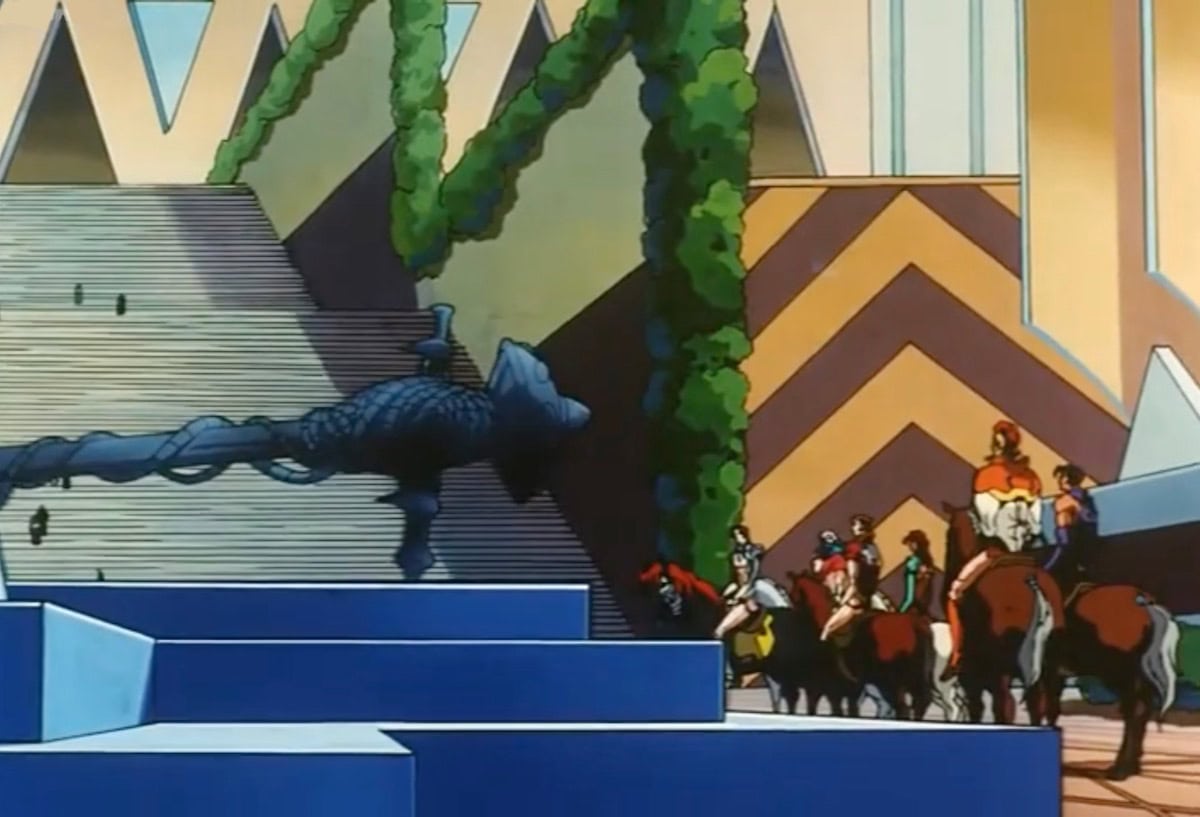The imaginative “Reign the Conqueror” anime, based on the life of Alexander the Great, is a must-see anime! From its striking visual style to its immersive narrative, “Reign the Conqueror” is more than just a historical retelling; it’s a vibrant exploration of ambition, power, and the human condition.
The art direction, reminiscent of classical Greek art yet infused with futuristic elements, creates an atmosphere that is spellbinding! Each frame is a visual feast, with plenty of epic scenes that evoke both awe and introspection.
What truly sets “Reign the Conqueror” apart is its layered storytelling. The anime delves into the psyche of Prince Alexander who went on to become king, illustrating not just his conquests but also the burdens of leadership and the shadowy weight of destiny.
The incorporation of sci-fi fantasy elements into the anime introduces intriguing concepts of fate manipulation and alternate realities, leaving viewers questioning the nature of their choices.
Moreover, the supporting cast is equally compelling, with each character offering unique insights and motivations that enrich the overarching narrative. The intricate interplay of divine intervention – including figures from Greek mythology and mystic figures – adds an enchanting layer of complexity, weaving together personal and mythic themes.
Seriously, this is one of the best Greek Mythology Anime series you could ever hope to see.
Alexander the Great Anime Review: Reign the Conqueror Episodes
This amazing animated series, based on the life of Alexander the Great, consists of thirteen episodes that take audiences on a breathtaking journey through his mind, reimagining his quest for domination in a world where the boundaries of reality blur.
Within the vibrant tapestry of anime, few titles stand out like “Reign: The Conqueror,” an ambitious masterpiece that weaves together a rich amalgamation of sci-fi, Greek mythology, and historical adventure.
In a landscape teeming with anime, “Reign: The Conqueror” emerges as a must-watch gem, inviting us to reflect on our own paths of conquest and contemplation. Prepare to be enthralled!
This is an extremely unique retelling of the story of Alexander the Great, prince of Macedonia who would go on to become a formidable warrior king. Alexander must contend with the burden of an unclear prophecy that foretells his destiny to conquer and destroy the world!
The story takes place in and around 356 BC. Upon inheriting the crown, he ascends to the throne as king of the Macedonians and embarks on a rapid campaign of conquest.
Eventually, Alexander confronts his destined nemesis, Darius III, in a war against Persia. This conflict transforms him into the very embodiment of destruction he was fated to become, ensuring the annihilation of all in his path, and possibly his own demise as well.d!
Reign the Conqueror (Episode 1): A Prophecy Born This Day
Every Reign the Conqueror anime episode begins mysteriously with dialogue that seems a bit out of place as shown in the bold text.
By rules of mathematical law did Plato solve that ultimate puzzle known as the Universe. The existence of all things is but a reflection of their eternal perfect form and such form must by necessity by its very perfection exist. The laws proof – the tetrahedron – would prove the cursed prize, sought at the cost of all loyalties, of any an army of heroes.
The story of Reign the Conqueror begins after an introduction like this, as it does similarly for all of the thirteen episodes in this amazing Alexander the Great anime series.
In the ancient world, destruction raged across the land, beset by dark forces from beyond the mortal realm. Queen Olympias, entwined with a serpent, gave birth to Alexander, a child of destiny. King Philip II of Macedonia frantically sought to stop the birth, but it was already too late.
As war loomed on the horizon, Thebes and Athens seemed to have formed an uneasy alliance, while Macedonia saw it as a golden opportunity to gain an even more glorious victory.
Philotus, son of Parmenion, was dispatched to summon Prince Alexander, who lay resting in a pool when an unknown assassin launched a surprise attack. Alexander fought valiantly and sent the assassin fleeing.

Rumblings of discontent were beginning to spread through King Philip’s army as they prepared to face an enemy of 15,000 strong. Some soldiers and Macedonians questioned their chances of victory.
Ptolemy, part of the cavalry, found himself in dire straits. The heavily armored phalanx infantry believed their heavy armor and fighting skills made them invincible. They were convinced that they held the key to winning battles for the Macedonian army.
Alexander considered speed to be one weaknesses of the Macedonians and sought the counsel of Aristotle, who was driven by his passion for order in the Greek world.
Meanwhile, the fearsome man-eating horse Bucephalus continued to run wild. Cleitus and Ptolemy attempted to capture the beast, but Prince Alexander intervened, trying to tame it himself – an audacious move that earned him disapproval from others.
While doing so, some mystic assassins struck again, this time imprisoning Alexander within an energy barrier shield wanting to kill him. Just as one of them prepared to deliver the final blow with a dagger, Alexander broke free from the force field and escaped.
The assassins were revealed to be disciples of Pythagoras from southern Italy. Philotus, who had arrived on the scene with Alexander is shocked that one assassin still remained alive and exclaimed: “By Zeus, he’s still alive!” The assassin mentions someting about a Platohedron and finally murmured: “The two must remain… they must never converge as one,” echoing his teacher’s cryptic warning. Almost immediately after, the assassin died.
Alexander then asked the warrior Cleitus to be his speed, together with Bucephalus, the fierce horse he has befriended.

At the end of episode 1, they were seen riding with a huge army behind them joining forces with King Philip II of Macedonia and his followers.
Reign the Conqueror (Episode 2): The Thunder of Battle
Hellas and Hellenism, the dark science of chaos. The discipline of destruction, the black art whose goal is the end of worlds. From the root Hellas, the dominion of Hella, she who is born of chaos, mother God… supernal quintessence of all the world, her direct descendant and the high priestess of her dark cult was Olympias, mother of Alexander the Great.
At the beginning of episode 2, Aristotle can be seen imparting his beliefs to Alexander. He ultimately believes that Alexander and Philip must emerge victorious in war to eliminate Persia as a threat.
The recent war that Alexander fought in resulted in the defeat of Karonia, earning him extreme praise.

Meanwhile, Attalos offers his beautiful daughter to King Philip of Macedonia, the ruler of the Greek world. Attalos desires King Philip to divorce his wife, Olympias, due to her offensive pagan rituals and behavior. However, his main motivational driver is to make his own daughter queen.

The mystic assassins from the school of Pythagoras, who are familiar with Aristotle’s past as a pupil of Plato, find him. They seek knowledge of the location of the Platohedron, a mysterious and powerful artifact. But they are defeated with the assistance of his niece, Cassandra.
In the wake of Xerxes III’s assassination, Darius III has taken the throne and is proclaiming himself the shining king of the world. As Episode 2 concludes, Alexander discovers that King Philip has divorced his mother, Olympias. He’s very mad about it.
Reign the Conqueror (Episode 3): A Failure of Diplomacy
Reason, harmony, beauty… these are all born of order. The absence of order produces only one offspring – chaos. It is said that when Aristotle abandoned the Academy, Plato commented that a young cult kicked and deserted its mother… and all millennia to follow were to stagger in the wake of the aftershock.
Alexander’s childhood initiation into a cult by his mother, Olympias, were remembered.
Ptolemy can be seen leading a slave caravan into Babylon, seeking to foil any connection that enemies of Macedonia were trying to make with the Persian Empire. King Philip II of Macedon had heard rumors that his enemies from Athens might be seeking an alliance with the Persians.
Alexander, Ptolemy, Cletus, and Alexander, managed to infiltrate Babylon undetected. As they explored the city, they were struck by its sheer scale and grandeur. The palace complex of Babylon, enormous in comparison to the palace in Pella, Macedonia. It left them in awe.
While exploring the city, one of them exclaimed, “By Athena, it’s an island in the sky!” referring to the famed hanging gardens of Babylon.
As they marveled at the wonders of Babylon, they were discovered by some guards. Alexander quickly assessed the situation and decided that if he created chaos, the guards would assume it was a group of Athenians/Greeks and any potential alliances would likely be foiled. He hoped to capitalize on this assumption.
Alexander soon after found himself face-to-face with Roxanne, a beautiful young lady whose identity remained unclear.
Not long after, he crossed paths with Darius III of Persia, who was his arch-nemesis. In a bold move, Alexander had donned a woman’s attire and a head covering, to remain undetected.

Meanwhile, an apparition of Greek philosopher Plato appeared before Aristotle, who appeared to him in spirit form. The ghostly philosopher presented Aristotle with a Plato-hedran, the powerful object whose purpose remained a mystery.

Ptolemy ended up being captured during their escapades, and Alexander and Cleitus boldly tried to rescue him. In order to free their friend, they messed with the city’s stables and freed all the horses, causing chaos as they galloped loose through the streets of the city. By the end of episode 3, they saved their friend and escaped from Babylon city safe and well.
Reign the Conqueror (Episode 4): Ascension to the Thrown
To the Greeks, the authority of the head of the family was absolute. The legends say that Cronos assumed authority by killing his father at the behest of his mother. Cronos in turn fore saw that history would be repeated, and that his own son, Zeus, would overthrow him. Thus prophecy and patricide were closely bound in their mythology from the very beginning.
In episode 4, Alexander and his close allies have returned to Pella in Macedonia. Olympias’s anger towards Philip rages and she has cursed him. She is also furious with Alexander for not harboring the same kind of hatred towards his father that she possesses. After all, King Philip wants to eventually make his new son the heir to the thrown, rather than Alexander.
Meanwhile, Aristotle is working on a mechanical warrior for Philip, while also agreeing to serve as tutor and mentor to Philip’s young child when he becomes of suitable age. Philip announces plans for a grand celebration to honor his latest conquests, featuring a ceremony dedicated to the 12 Olympian Gods – but with one notable exception: he’ll be depicted as the 13th God himself.
As Aristotle departs from Philip’s presence, Cassandra approaches him and they talk… while Eurydice struggles with unsettling visions and nightmares.
An assassin arrives in Pella, one who poses an unprecedented threat to Alexander’s life. Suspicion falls upon King Philip as tensions escalate.
At the celebration, King Philip unveils the huge statue of himself. No one expected to see Alexander at the celebration, not even Philip, but nevertheless Alexander makes his entrance amidst cheers and applause.

As Philip is on stage, disaster strikes: his statue crumbles. From within the wreckage, a mechanical warrior fires an arrow at Philip – but Alexander intervenes just in time to save his father’s life by pushing him out of the way. The celebration continues, but while Philip is still on stage, someone approaches from behind and pierces him with a sword, killing him.
Attalos is held responsible by Alexander. Cassandra turned to her Uncle Aristotle who was by her side in the crowd reminding him of past knowledge he discussed with her about a powerful herb that is able to control someone’s actions by draining their will. According to Aristotle, the priestesses of Epirus used this herb.

It soon becomes clear that Olympias exacted her revenge because of King Philip’s betrayal. As Philip lies dying on stage at the end of episode 4, Olympias approaches him and appears to be overjoyed by his sudden death. It becomes clear that everything has changed. The event was also meant to announce Philip’s new heir, but now everything has been upended by the king’s assassination.
Reign the Conqueror (Episode 5): God of Creation
Philosophy was born in Agora where individuals from opposite ends of the earth gathered together to engage in idealistic discussions. The result was the birth of the great talk – the Socrates dialectics… and so the destiny of Thebes and Athens hangs in the balance.
King Philip is dead, and Athens no longer views Alexander as such a big threat due to his inexperience and the turmoil within its borders. Diogenes has arrived in Athens, and Thebes has been destroyed by the Macedonian army.
In a flashback, King Philip can be heard delivering a speech: “All Greek nations are descendants of the mother Goddess, Hera. Therefore, we must unite to stop the invasion of the Persian barbarians.” Olympias then speaks, claiming she has received a prophecy from the Gods that her unborn son is destined to destroy the world.
The council of Athens wants Diogenes, the great Greek philosopher who lives in a large wine barrel, to negotiate peace with Alexander. They consider Diogenes to be the wisest man in Greece, and they believe that if Alexander were to meet Diogenes, it would lead to a favorable outcome. Diogenes is often called the “insane Socrates.”
Meanwhile, Aristotle, back home in Macedonia, tells Cassandra that he wonders whether Alexander knows the secret of the Platohedron.
Alexander ends up visiting Diogenes, the philosopher, who lives like a beggar in a wine barrel.

King Alexander offers him anything he wants – he just needs to ask. In exchange for fulfilling his request, Alexander seeks an equivalent from Athens as compensation. Diogenes simply asks him to take three steps to the right as Alexander is blocking his sunlight.
After this, Alexander enters the wine barrel – a universe unto itself. He wants Diogenes to tell him who he is. The great philosopher, who has a strong resemblance to Yoda, replies that he is Alexander the Great, King of Macedonia.
Alexander is troubled by a prophecy that he will one day destroy the world, and asks Diogenes if this will come to pass. Diogenes responds that the answer lies within Alexander himself.

Eventually, Alexander withdraws his demands from Athens. Someone posed the question: does Athens have anything to offer that could be deemed equivalent to the sun? If it does, then it would have to be the city’s prosperity, which is akin to the sun, like royalty.
Reign the Conqueror (Episode 6): The Secret of Samothrace
The concept of a perfect number is believed to exist. According to the principles of Euclid, the first of these is six… and yet there is another belief. The Pythagorian school puts their faith in a sacred emblem embodying the harmony and order of the universe.
In a flashback, King Philip can be seen undergoing an initiation at a secret ceremony. This is where he meets Olympias.

Astonishingly, it’s disclosed that Alexander is the son of the god Zeus, who transformed himself into a snake to unite with Olympias. In another shock disclosure, Olympias is revealed to be a witch.
Meanwhile, the Persians learn about the rise of Alexander becoming King of Macedonia, but for now, they do not fear him much. Roxanne, the beautiful woman Alexander met in Babylon, hears about him and realizes he’s the same man she must have encountered.
The episode ends with Alexander leading his troops within sight of the island of Samothrace.

Reign the Conqueror (Episode 7): The Gordian Knot
How many were there… the true wonders of the world embracing the divine work and the elements of nature, encompassing death and reincarnation, the many faces of the moon, the mysterious planets that surround us, and the true heavenly order? We believe there are seven.
In this episode of Reign the Conqueror, King Alexander approaches the Tomb of Mephauplous, which is one of the seven wonders of the world, alongside the Temple of Artemis in Ephesus. Alexander soon encounters the famed Gordian Knot. According to legend, whoever can unravel the knot will become king and ruler of Asia.

While in close vicinity to the Gordian Knot, Alexander learns about the doctor named Philippos, who has a reputation for helping those in need. Alexander meets Philippos and wishes him to become his chief physician. However, the doctor declines, citing a prophecy that foretold he could serve only one man – the one who would unravel the Gordian Knot. Alexander requests that the doctor follow him outside, where he cuts the Gordian Knot.
Not long after, a Persian army of 500,000 arrives to battle against the Macedonian army. Nevertheless, Alexander remains unfazed, even though he knows that the Persian force is ten times the size of his own Macedonian army.

In a fierce battle against Darius III, Alexander is on the verge of striking him down when his efforts are thwarted at the last moment by members of the Pythagorean cult.
Due to outside interference, Darius orders his army to retreat, as he wishes it to be a king versus king fight.
Philotus experiences visions of a nightmarish ceremony involving Olympias. She is resurrected in a bizarre manner following a human sacrifice. When Philotus awakens, he is left questioning the reality of his vision, haunted by the belief that Alexander may one day indeed bring destruction upon the world. In an ironic twist, it is Alexander who had just saved his life.
Reign the Conqueror (Episode 8): Here Shall Stand Alexandria
Architects for Dionysus, so they were called. It was believed that King Solomon hired them to rebuild his temple. They were mystics, worshippers of the God, Dionysus, who passed on their knowledge through secret ceremonies… secret ceremonies and mathematics. There exists a key which connects these two.
Alexander and his army have arrived in Egypt, settling in a desert location along the coast. Their aim is to establish a new city there reminiscent of Athens.
Dinocrates, a genius in designer, showcases his clever inventions, including a miniature robotic Pegasus and a flying bird that delight the soldiers. Alexander seeks out Dinocrates and learns that he spends much of his time perched on a cliff, overlooking the proposed city site.

During their conversation, Alexander discovers that Dinocrates has strong opinions about the ideal location for the new city.
While talking to Dinocrates, Alexander finds himself mysteriously transported to the future, within the city. He encounters two men there who are in trouble with the city’s guards for breaking into a warehouse. Alexander fights and escapes after the guards chased him, as they believed he must have all been involved n the breakin as well.
Alexander learns that the two men, Ibn and Zariwari, are Persian. They end up telling Alexander about a jewel imbued with more knowledge than all the books in the Great Library combined, which is known as the Platohedron. Allegedly, the Platohedron is hidden underground in the King’s tomb, which Alexander quickly realizes is his own tomb. He is the great king who died over a century ago.
Eager to be led to the entrance to his own tomb, Alexander discovers a sign that reads, “No one can open this door except those who are close to the great king’s soul.” When Alexander touches the wall and the door opens before him. He enters, accompanied by the two men, and soon finds himself in a chamber that holds the secret technology of Pythagoras.

Eventually, Alexander encounters the spirit of Aristotle, who has patiently waited for him. As Alexander reaches out, his hand passes through Aristotle’s ethereal form, revealing the Platohedron. Ignoring Aristotle’s warning not to touch it, Alexander grasps the object. Instantly, the chamber begins to flood with water, which ejected him outside from the chamber.
Moments later, Alexander reappears beside Dinocrates, as if he had never left. Alexander’s close allies ride up on their horses and inform him that a messenger from the great priest of Egypt has come to see him. Before departing, Alexander tells Dinocrates that he will be in charge of constructing the new city.
Reign the Conqueror (Episode 9): The Oracle of Ammon
The School of Athens, by the artist Raphael, depicts two figures on the right: one is a geometrician, Euclid, the father of geometry, and the other is Zoroaster, a prophet holding the heavens.
Darius talks with his chief advisor regarding how to destroy King Alexander and his army.

Around the same time, Alexander is inside a temple seeking a prophecy from the god Ammon.

The prophecy reveals that Alexander will be ruler of the world. He is also informed that he will become the devil of destruction, fully aware of the sorrow that comes with destroying all those closest to him. Alexander is also told that he will be slain by the person he trusts the most.
Ptolemy decides to enter his own gate so he too can receive a prophecy about his own fate. He is told that his destiny is to become ruler of the world, the king of Egypt, which he finds very unsettling.
Cassandra learns that her uncle wants her to protect Alexander so that he can restore order to Greece.
Alexander tells Philippos that he is building a city in the shape of the human body. He saw the universe there, but as soon as he tried to touch it, it slipped through his fingers.
Then, out of nowhere, some spirit-like figures appeared, the followers of the god Zoroaster. They tell Alexander that they must kill him in order to complete their chief prophecy. However, this contradicts Alexander’s own prophecy, which states that he would be killed by someone he trusts.
Alexander’s enemies insist that the prophecies cannot contradict each other, as this universe is one truth consisting of both good and evil. Alexander disagrees due to his belief that more than one universe exists. It turns out the figures who want to kill Alexander are from the Pythagorean cult, after they’ve transforming themselves in his presence once again. Alexander attacks them, but they were not destroyed, so they would likely attempt to kill him again in the future. After the attack, Alexander tells Philippos that he will show him another universe.
The massive army led by Darius is fast approaching, and the mysterious woman Roxanne is in their company.
Reign the Conqueror (Episode 10): Persia Shall Fall
Through the ages Aristotle’s wisdom has been revered as a universal theory. Homer is thought to be the ideal, and yet, we have Achilles. Who is Alexander?
Alexander has a daydream just before going into battle against Darius and his army, in which he encounters Roxanne once again. She wickedly transformed into his mother, Olympias, who reminded him to follow his calling to destroy the world.
King Alexander and his generals have discussions about battle strategies.

Aristotle has traveled to Athens to visit Diogenes, the smallish man living in a wine barrel. Aristotle has concluded that it is Diogenes (the insane Socrates) who possesses the Platohedron. Master Plato bestowed the entire knowledge of the universe into the Platohedron jewel, and Aristotle believes it must be under the care of Socrates, even if it is the insane Socrates. He asks for its return.
It is revealed that Plato had indeed visited Diogenes. Plato told him that whoever possesses the Platohedron holds ultimate knowledge and the power to destroy the world. He then declared that Diogenes would be the protector of this knowledge, fulfilling Plato’s final wish. However, Diogenes cast the Platohedron into the chaotic universe.
The war between the two kings, Alexander and Darius, gets bloody. Both kings still have complete faith that they will be victorious over the other side.

As the battle progresses, an eclipse occurs creating awe! It frightened the Persians, as the moon is considered a symbol of Persia. The Macedonians, in contrast, felt that victory was near.
The battle between the kings is being observed by Diogenes and Aristotle. Diogenes believes that it is passion itself that possesses the power to retrieve the Platohedron from the depths of chaos.
As Alexander and Darius clash with their swords, Darius’s blade shatters, and he is struck in the chest. As Darius looks into Alexander’s piercing eyes, he dies. Alexander’s army emerges victorious over the Persian forces.
In the aftermath, Alexander breaks open the door of a Persian caravan and pulls out Roxanne, the woman he had once met.
Reign the Conqueror: Episodes 11, 12, and 13
There are three more episodes in the Reign the Conqueror anime series. I won’t reveal anything about the final three episodes of Reign the Conqueror. Hopefully, it will make you feel compelled to watch the entire Reign the Conqueror anime series for yourself. What else can happen in this brilliant Alexander the Great anime? Plenty…
Reign the Conqueror: Anime Review Conclusion
“Reign the Conqueror” is an enthralling journey that intertwines the legendary exploits of Alexander the Great with a tapestry of myth and philosophy. From the very first scene, the series pulls you into a visually stunning world where the vibrant landscapes and dynamic characters leap off the screen. The animation style is both striking and immersive, creating an atmosphere that feels as alive as the historical narrative it seeks to portray.
What makes this anime stand out is its intricate portrayal of Alexander as not only a conqueror but also a deeply flawed human being. The series dares to explore his vulnerabilities, offering a nuanced perspective that goes beyond the traditional heroic narrative. The emotional depth of the characters is matched by their philosophical dilemmas, making viewers ponder the true meaning of greatness and ambition.
The soundtrack complements the storytelling beautifully, enhancing the emotional stakes and enriching the viewing experience. Each episode leaves you longing to see what unfolds next as it builds toward an epic climax. In essence, “Reign the Conqueror” is a captivating blend of action, introspection, and artistry that challenges the conventions of historical storytelling.
It’s a rich experience that left me both entertained and reflective, making it an essential anime for anyone fascinated by ancient history or mythology.
You can purchase Reign the Conqueror: anime on DVD. The 13 episodes are contained in four DVD’s.
Another option is to search for the “Reign the Conqueror” anime on YouTube, where you’ll hopefully be able to find it as well.
Reign: The Conqueror anime is typically what it is known by in North America. The anime also goes by Alexander the Great in Europe, and Alexander Senki in Japan.
A movie version of this anime is also available, but you definitely need to check out the entire series. All of the 13 episodes in this 1999-2000 series are about 24 minutes in length, so that equates to about 5 hours and 20 minutes of viewing pleasure in total. It’s brilliant entertainment, so I encourage you to watch it.
Pin it … Share it






